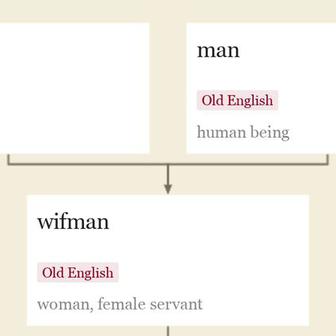womankind n.
late 14c., from woman (n.) + kind (n.).
Entries linking to womankind

"
It is notable that it was thought necessary to join wif, a neuter noun, representing a female person, to man, a masc. noun representing either a male or female person, to form a word denoting a female person exclusively. [Century Dictionary]
The formation is peculiar to English and Dutch. Replaced older Old English wif and quean as the word for "
The pronunciation of the singular altered in Middle English by the rounding influence of -w-; the plural retains the original vowel. Meaning "
In American English, lady is "
Woman-hater "
"
Ælfric's rendition of "
Phrase a kind of (1590s) indicating something like or similar to something else led to the colloquial extension as adverb (1804) in phrases such as kind of stupid "
updated on April 08, 2014